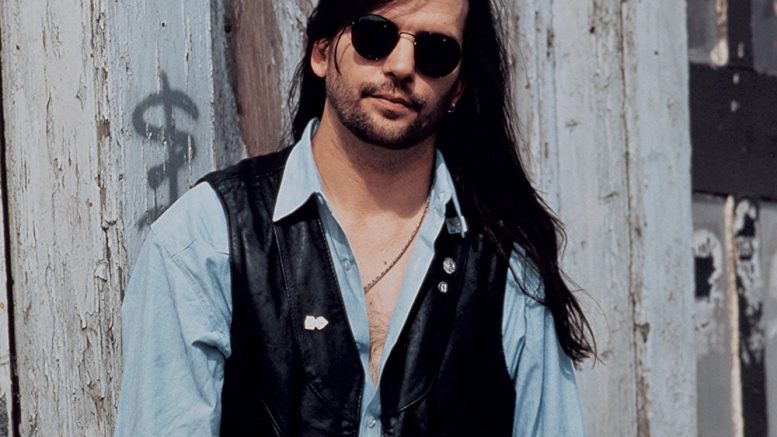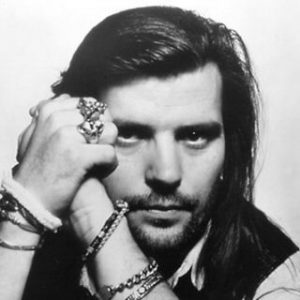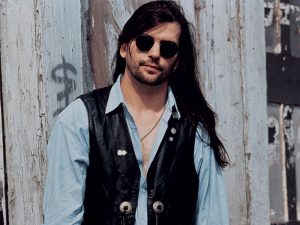|
Nick Krewen The Hamilton Spectator December 3, 1987
“Now the revenue man wanted Grandaddy bad He headed up the holler with everything he had It’s before my time but I’ve been told He never came back from Copperhead Road.”
– from “Copperhead Road”, written by Steve Earle, copyright 1987 Duke Of Earle/ Goldline Music (ASCAP).
Rock ‘n’ roll rebel or country crusader? Virginian-born Steve Earle would like to be both, but he asserts that his new album, Copperhead Road , is definitely setting its sights on establishing a rock audience. “I’m real proud of it,” said Earle recently in an exclusive Spectator interview. “This record is definitely going to keep me off the Grand Ole Opry. I think we’ve made a real rock ‘n roll album. People that only know me from Guitar Town might be freaked out a bit, although anyone who also followed Exit O and the live thing won’t be taken aback at all. Sonically, the rhythm section’s a lot tougher.” But Earle made it clear he wasn’t abandoning his country audience. “I’ll always record in Nashville or Memphis,” he assures. “But we’ve feel like we’ve seen all the growth we’re going to see with a country base.” He was displeased enough with his previous record company, MCA Nashville – to switch to another division of MCA, the reincarnated, New York-based UNI Records. “I knew I was making a record that Nashville wasn’t going to be able to do anything with,” he states. A survivor of the war hype surrounding country traditionalism, he feels the movement will have a lasting effect. “There’s always going to be a new traditionalist sub-genre,” said Earle, 34. “Nashville is patting itself on the back because it’s accepted Rosanne Cash and Rodney Crowell, but that’s as radical as mainstream country radio is going to get for awhile. “That’s what I expected, and I knew I’d have to go outside the radio format, and make a step to rock radio. My theory is that I won’t have top ten country singles, but there’s 2500 radio stations that play country music in the States, and I think the majority of them will continue to play my records.” While Earle agrees that his American chart numbers weren’t impressive, he said airplay royalties were “significant.” “I made a ridiculous amount of money through airplay,” he said. “I’m just glad that UNI existed, because I don’t think I would have made another record for MCA Nashville, who strictly depend on country music radio for their marketing techniques. There are other ways to sell records.” Copperhead Road is one of the year’s best – a feisty collection of traditional country foxtrot, swinging rock ‘n roll and urban blues packed with the potent passion of one of last year’s classic country-rock tunes, “I Ain’t Ever Satisfied.” The album also contains musical help from some high-profile friends, among them Bill Lloyd (who plays electric), Radney Foster, Maria McKee, Neil MacColl from The Bible, Telluride and Irish folk punters The Pogues, who guest on the track “Johnny Comes Lately.” “I’m a big fan of The Pogues,” confesses Earle. “The first album I heard was Rum, Sodomy And The Lash, and I just about wore it out. My production manager on last year’s tour – Bill Ramey – was the Pogues’ tour manager on their first U.S. tour. He called me up when I was in London and said The Pogues wanted to meet me. “They were in London, recording the demos for If I Should Fall From Grace With God at Abbey Road. They were hiding from their label, so they were booked as The Terry Woods Quartet. “So I hung out with them, and we stayed at the Columbia Hotel in London. That’s where the idea for ‘Johnny Comes Lately’ came from, because it’s about an American flyer mouthing off at the bar in Camden during World War II. The Columbia Hotel is where a lot of American flyers stayed during the war. “Stylistically, I ripped it off so badly from the Pogues that it just seemed like the thing to do is record it with them.” Recorded the day before St. Patrick’s Day, Earle said the mix remained untouched for the album, which was finished in Memphis in June. “We began the album on May 2, and we finished it quite a bit earlier and $35,000 (U.S.) under budget. The album was originally budgeted for $220,000, and we brought it in at about $168,000.” The thrice-divorced Earle – who in an earlier interview told me “every five years I find another woman who hates me and buy her a house” – seems qualified to understand the human condition – and some of the disruptive, renegade lifestyles described on Copperhead Road. “Copperhead Road is a totally mythical place,” Earle explained. “The idea behind it is that people are going to find a way to get by, regardless of the law. The guy in the song is a Vietnam vet, and his father and his grandfather were in the moonshine business. He comes back from ‘Nam and discovers that areas in Western Carolina and Arkansas work very well for growing marijuana. “Marijuana is one of the biggest cash crops in the United States, and the majority of what’s being consumed in the U.S. is being grown domestically, rather than being smuggled in. They say a lot of jobs have been lost – but there are a lot of parts in the country where jobs never existed in the first place. “‘Copperhead Road’ is a song about people just getting by however they can.” Earle revealed that one of the album’s strongest tracks – “The Devil’s Right Hand” – was on a previous CBS album he recorded five years ago. “I’ve tried to record it on every album,” he said. “But I couldn’t get permission from CBS. I always felt it deserved a more well -developed arrangement. The arrangement on the record is actually by Garry Tallent– Bruce Springsteen‘s bassist – and he cut it on a guy named Lance Larson. I was so knocked out by it that it got me interested in the song again, so I tried one more time to get permission. We discovered that the five-year agreement had expired, so we didn’t need permission anymore.” “The Devil’s Right Hand” was also used in the recent Costas-Gravas film Betrayed – starring Tom Berenger and Debra Winger – but the track was wrongly credited to Waylon Jennings, whose version was used in the movie. “Not only did the filmmakers not clear the MCA track – Waylon’s version of it – they didn’t clear the title with me,” said Earle. “And they got the authorship wrong. The thing I don’t dig is that it’s a song I’m real proud of – and I like Waylon a lot – but I’m not going to give him credit for writing that song.” The possibility of legal action was removed when the filmmakers agreed to compensate Earle for the oversight. He feels Copperhead Road – already platinum in Canada – will do well in North America because of the current focus on singer/songwriters. “When you’ve got people like Tracy Chapman selling five-times platinum, it ups the ante for everybody,” said Earle. “I think labels are starting to realize that people will respond to a great song. No matter how many times somebody appears on MTV or how pretty artists are, what inspires people to go out and buy a record is a great song. “We opened a bunch of dates for Hank (Williams) Jr. in the South last year, and the kids that talked to us were all wearing AC/DC t-shirts. They listen to metal mainly because that’s what pisses their parents off the worst, but they get hold of something like ‘(I Ain’t Ever) Satisfied’ and they can relate. Those songs are about them.” Aside from recording the album, 1988 has been a busy year for Steve Earle. He produced Eureka, the first album from British rock group The Bible, and was in the running to produce the recently-released Waterboys album, Fisherman’s Blues (“one of the most incredible songs I’ve heard in my life,” says Earle). He’s also writing new material with Maria McKee of Lone Justice, Will Sexton of Will And The Kill, and Jason Ringenberg of Jason And The Scorchers...and has put in a bid to produce The Scorchers’ debut album for A&M Records. He’s also in the process of writing a novel and has just bought a house in Tennessee which he’s furnishing with a 16-track studio. Currently on tour in Europe with a seven-piece band, the altered line-up includes the new rhythm section of Kelly Looney and Craig Wright on bass and drums, Donnie Roberts on lead guitar and Michael McAdam as “utility man” on keyboards and guitar . Earle is hoping to play Canada in the spring, possibly as early as February. In the meantime, Steve Earle will just savor the creative satisfaction behind Copperhead Road. “I needed this record real badly,” said Earle. “I felt I had something to say, and when you get a lot of blood in the tracks, people pick up on it. “I think you have a responsibility to people if you write, to mirror them. When I get into political themes in my songs, it’s not so much my politics as it’s a mirror for other people’s politics. Entertainment isn’t necessarily escapism, and I think the idea of hearing that someone does care, that someone does know what people go through on a day-to-day basis, helps.”
|
Steve Earle speeds down Copperhead Road



